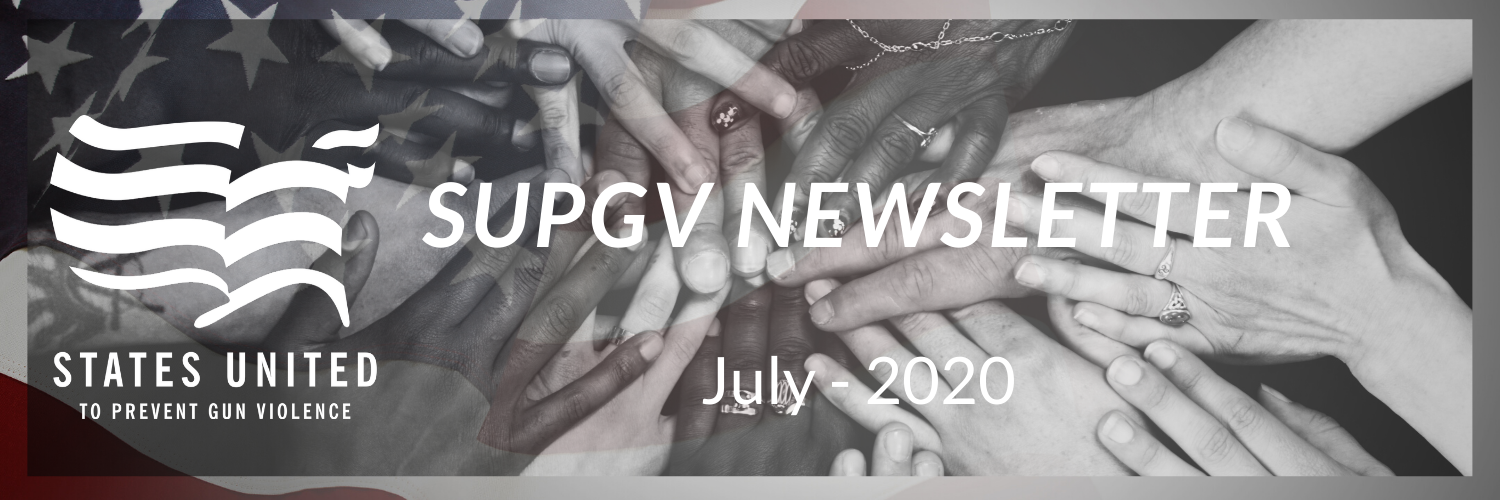| |  | John, It is devastating to watch as more black and brown communities in urban areas are ripped apart by covid -19, and literally by gun fire. It is painful to see how our movement has failed Black communities and other communities of color. It is painful to know that the wounded are trying to gather up the pieces of their lives with few resources and little support. I also know that every day, I am joined by dedicated state affiliate staff and supporters to continue the work of gun violence prevention. There have been new partnerships made, and new conversations are being held about what policies look like–not just for white communities–but for all communities. The next five months will find all of us fighting as hard as we can, with both new and existing partners, to get out the vote. We are moving in a good direction, but we must do more to transform this movement. The beauty of States United is that we come to this work from different places. That also brings challenges that we must overcome. We have added new board members, and are in conversation with potential new board members. New Voices will allow for new conversations about not only new laws, and policy, it allows for a future. Gun violence is a public health problem and always has been. We all have the essential human right to live free of gun violence. To succeed in our work, we must tear down old ways of communication and build new ones. We dream of doing no more harm and acknowledge that we need help. I hope you will all engage with us during this new time of building anew. As a mother and as a survivor, I know we can rise up from the dust of this past three years and do whatever it takes to push forward. Embrace, bring in new, and, listen to the sisters, elders, and, young leaders to make change happen. Sending grace and hope, Clai Lasher-Sommers Executive Director | | | | | | Police Violence Is Gun Violence The surge in awareness around police violence and police vigilantism has brought to light some long-ignored truths about how the police interact with people in communities where there are high numbers of shootings. In cities long regarded as murder capitals, residents cite a lack of trust in law enforcement who are known more for penalizing minor offenses than for solving murders. In these cities and neighborhoods, a small fraction of residents are involved in violent crime, yet researchers documented a combination of distrust in law enforcement, underreporting of crimes, and decline in witness cooperation in broad swaths of the population. Alternatively, in cities like Oakland, CA, and Camden, NJ, community-led efforts have resulted in a significant decrease in gun violence without an increase in police presence or policy-induced violence. When the police come to regard themselves and judge, jury, and executioner, violence and death will follow. Police violence is gun violence, and it is time to hold accountable those who have abandoned their oath to serve and protect. Read more | | | | | | More than 70 People Testify Against Ohio Stand Your Ground Law Ohio Coalition Against Gun Violence reported that dozens of people, including lawyers, students, and other private citizens, testified against a potentially devastating stand your ground bill before the Ohio House Criminal Justice Committee early in June. The bill was characterized as overly generous to people who shoot someone, purportedly in self-defense. Such laws have been used disproportionately to exonerate white people who have killed Black people; it is 10 times more likely than a white person shooting a Black person will be deemed justified, than if a Black person shoots a white person. These other astonishing statistics that cement stand your ground bills in the pantheon of race-driven legislation can be found in the U.S. Commission on Civil Rights; report: Examing the Race Effects of Stand Your Ground Laws and Related Issues. | | | | | | | | Rhode Island Bans Ghost Guns The Rhode Island Coalition Against Gun Violence scored a major victory on June 23rd when Gov. Gina Raimondo signed into law a bill that bans ghost guns and any untraceable gun. Under the law, no one can build, own, or sell a ghost gun or untraceable gun, unless it was made before 1968. Those who legally own ghost guns now have a 30-day grace period to get them serialized. The Governor cited the public health risk posed by gun violence. Rhode Island is the fifth state to pass a law concerning untraceable guns, along with California, Connecticut, New Jersey, and Washington. | | | | | | Data Highlight: Texas States United Board member Aerielle Matsangos, MHS, is working to compile and analyze gun violence data from every state. The data, which looks at gun deaths by type (homicide, suicide, unintentional, law enforcement), gender, age, and race, will be accessible on the new SUPGV website and will be an invaluable reference for all of our state affiliates and anyone exploring or working in gun violence prevention. We will highlight data from various states starting this month with Texas. Texas’s overall numbers of gun fatalities are slightly above the national average, at 12.3 deaths per 100,000 people, versus the national average of 11.9 deaths. Although gun suicides accounted for the majority (64%) of fatal gun violence in Texas (2018), gun homicides disproportionately impacted Black people. In 2018, Black males were 4.7 times more likely to die by gun homicide than white males (20.9- and 4.5-deaths per 100,000 people, respectively). Between 2009-2018, gun homicide death rates increased among Black males (+21%); but decreased among White males (-13%) and females (-10%). In 2018, 36% of all gun homicide victims were Hispanic. You can find the full report here. | | | | | | | | | | | |